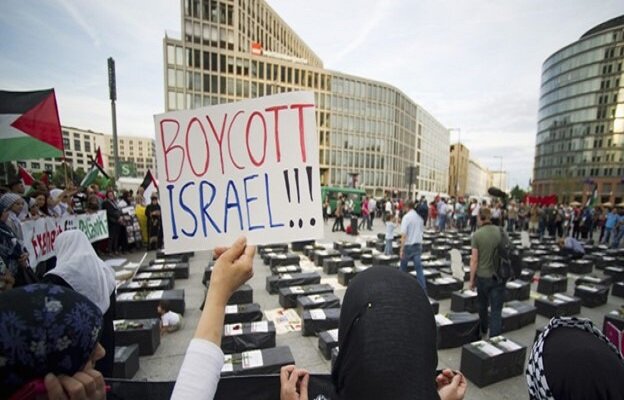The success of the campaign to boycott Israel in Islamic countries

| By welcoming the sanctions campaigns against the Zionist regime, the people of the Arab world proved in practice that their position in opposition to the Zionist regime is different from the position of the political rulers. |
report Mehr News, according to Al Jazeera, in the shadow of the continuation of the brutal aggression of the Zionist regime on the Gaza Strip and numerous calls to sanction this regime at various levels In order to support the Palestinian people, the campaign to boycott the products of pro-Israel companies and brands such as Starbucks, McDonald’s, KFC, Carrefour and other related companies is accelerating and this campaign has achieved many successes in different countries of the world, especially Arab and Islamic countries. achieve. The boycott of the Zionist regime in different countries has now become a popular culture to express opposition to the occupation and condemn the aggression of the Zionist regime against the people of Gaza in different parts of the world.
The campaign to boycott Israel in Jordan
In this context, Carrefour branches that were active in Jordan have been closed. Also, Starbucks closed one of its branches in Amman, the capital of Jordan. Israel boycott campaigns have forced many American and Western brands to reduce production and reduce working hours, as well as lay off many of their employees.
Also in different cities of Jordan, famous restaurants and cafes such as McDonald’s, KFC, Burger King and Pizza Hut is almost empty and no one goes there to eat, while these cafes and restaurants were very busy in Jordan before the start of the boycott campaign against Israel.
In addition to those goods and products of famous brands that were popular before, such as Pepsi, Coca-Cola and Nestlé in the stores of cities Jordans are piled up and no one is buying them.
Shurouq Tomar, one of the media activists in the campaign to boycott Israel, says that the success of the campaign to boycott the Zionist regime in Jordan is unprecedented. ; Because the people of Jordan are extremely angry with Israel’s barbaric aggressions on the Gaza Strip and have launched a great movement to condemn these aggressions. Accordingly, Jordanian citizens do not go to buy products of brands that support the Zionist regime; Even if there is no substitute for these products. We see that even children have joined this campaign and this is completely unprecedented.
He emphasized that the boycott campaign of the Zionist regime, in addition to supporting the Palestinian people, has a significant and clear impact on the support It had national products and goods of Jordan, and many domestic companies can meet the needs of the market, and also Jordanian citizens realized that foreign goods are not superior to domestic goods, and national products should be supported.
Ahmed Awad, the director of the Center for Economic Studies in Amman, the capital of Jordan, said in this context: Some people are going to say that boycotting companies The foreign supporter of the Zionist regime causes the unemployment of a large number of Jordanian workers, and some talk about the unemployment of about 15 thousand people, but as an independent observer, I can confirm that these numbers are greatly exaggerated and after seven months of the campaign. The boycott of Israel, those who were fired from their jobs in foreign companies, were attracted to domestic markets and national companies and institutions that benefited from this boycott and increased their sales.
sanction of the Zionist regime in the Arab world
It should also be said about Egypt that the Reuters news agency quoted a management source in McDonald’s company as saying that The company’s sales have decreased by 70% in October and November.
Also in the country of Morocco, the culture of boycotting the Zionist regime among large sections of the people who sympathize with the people Palestine condemns the aggression of the occupying regime in the Gaza Strip, it has shown itself well and caused the branches of international brands that support Israel to be boycotted in the Maghreb.
In Kuwait, families and citizens of this country as well as foreign residents avoid buying products from companies that support the Zionist regime. and are looking for alternatives in the local market of Kuwait, and accordingly, the sales of these companies have decreased drastically.
Zionist sanctions in Malaysia and Indonesia
But in addition to Arab countries, many countries of the world have also joined the boycott campaign of the Zionist regime. In this context, 108 branches of KFC restaurants were closed in Malaysia. Pizza Hut, Starbucks and McDonald’s branches were also temporarily closed and there is currently no timetable for their reopening.
On the other hand, the Financial Times reported that General Atlantic and CVC Capital Partners sold several shares. Millions of dollars have been suspended by the companies that operate American fast food brands in Malaysia and Indonesia due to protests and sanctions against Israel.
People in the countries of Indonesia and Malaysia, which are mostly Muslim, since the start of the Israeli aggression on the Gaza Strip in October 2023 avoid buying products with American brands and have banned brands such as Starbucks, KFC and Pizzas due to Washington’s support for the crimes of the Zionist regime.
Also in Turkey, the country’s parliament removed Coca-Cola and Nestlé products from its restaurants, and a parliamentary source In Turkey, it showed the public anger of the people of this country against these two brands.
It is interesting to note that in line with the development of the global campaign to boycott the Zionist regime in Turkey, a practical application to support Palestine has been created to help people participate in the campaign to boycott pro-Israel companies. This application was launched by a Palestinian student named Ahmed Papash in November under the title “No Thank You” and is available to users for free. Within a month, 100,000 users installed this application.
[is_logged_in] Link [/is_logged_in]
|


